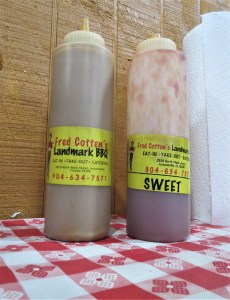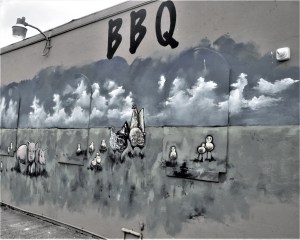by Tim Gilmore, 5/21/2017
Sometimes the smell is the last to leave the building. Lights turned off, doors locked, windows boarded with plywood, and still the still air left behind carries the particulates of the lives lived and the things they’ve done.
So in the late summer of 2015, when Melanie Dosztan toured the abandoned Fred Cotten’s Barbecue, 68 years of barbecuing ribs and pulling pork still hung in the air. She was here for one reason—not to bring Fred Cotten’s Barbecue back to life, but to keep it alive. The oldest barbecue joint in town had yet to give up its redolent ghost.
A 1984 Florida Times-Union article called Fred Cotten’s the place “where deals and meals are made.” Mayor Jake Godbold often conducted business here, both for the City of Jacksonville and for his company, Gateway Chemicals.
During Godbold’s eight years as mayor, especially after he was reelected with 71 percent of the vote in 1983, people referred to Jacksonville as “Jakesonville,” and instead of dining at the River Club, where business leaders and politicians met at the top of the Independent Life Building downtown, Godbold made deals over baby back ribs covered in Cotten’s special recipe sweet sauce in the humble little restaurant at Main and 17th Streets.
In May 2017, I sit at a red and white checkered tablecloth with a pulled pork sandwich and sides of collard greens and fried okra. I wouldn’t ask for “unsweet” tea.
Behind me, a corpulent man with long gray hair sits on a bar stool and tells a young girl, “It’s okay if I say ‘wop,’ cuz I am a wop.” This white Southerner certainly doesn’t look Italian, but says his mother’s Sicilian. He may also believe his grandmother was a Cherokee princess.
When Dosztan stepped into the abandoned restaurant, the sweet smoky scent of decades of cooking met her just inside the door.
Though the place clearly constituted a Jacksonville political and culinary landmark, no one could reopen Fred Cotten’s without Fred and Sara’s original secret recipe. But Billy Cowart owned it.
Fred Cotten died in 1982, Sara in 1999. Then Billy Cowart bought the business from Cotten’s nieces and ran it as Billy C’s Fred Cotten’s. After eight weeks, Lucille Baker, who’d managed the restaurant for five decades, stopped coming to work. Cowart knew she was angry the restaurant had left the family.
Though Cowart sunk all but a million bucks into Billy C’s Fred Cotten’s, the next 14 years went straight downhill.
When Melanie Dosztan decided to bring Fred Cotten’s back, Cowart still owned and protected the recipe. Johnnie Brown was the answer. When Dosztan next visited the empty building, Johnnie just walked through the door. He arrived like the epiphany he was.
Since 1989, he’d cooked for Fred Cotten’s, working for Sara herself his first decade. Billy Cowart may have owned the formula, but Johnnie Brown knew how to make Fred’s famous sauce as well as he knew his middle name.

Johnnie Brown, courtesy The Jacksonville Daily Record
In 1948, when Jake Godbold attended Kirby Smith Junior High School between East 10th and East 11th Streets, he’d make his way six blocks north for a sandwich at Fred Cotten’s. Fred had opened the joint two years before.
When Godbold was mayor, from 1979 to 1987, customers and employees alike referred to the booth reserved for him as Jake’s Table. Godbold was a man of the people, a post-Dixiecratic populist politician who knew Jacksonville like the back of his hand and made himself accessible to anyone.


Jake Godbold and award-winning civic volunteers, 1980, photo by Don Ray, courtesy Florida Times-Union
Godbold knew black Jacksonville as well as he did white, for “the people,” throughout the city’s history, always ranged between a quarter black and half.
He grew up in Northside housing projects near Brentwood Park, where so many of the city’s urban black kids lived. Newspapers called him a “good old boy,” but said he came “from the other side of the tracks.”

Jake Godbold speaking with senior citizens, 1983, photo by Frank Smith, courtesy Florida Times-Union
This “good old boy” even used that disparaging word “redneck” and got away with it. Criticizing government inefficiency, Mayor Godbold proclaimed, “City trucks never get a ticket for speeding because they are never going anywhere. We must have more pickup trucks than all the rednecks in Duval County.”
Godbold had been elected to the first City Council following Consolidation and later claimed Consolidation was oversold and rhetorically deceptive. One of the major purposes of consolidating the governments of Jacksonville and Duval County in 1968 was to protect the white power structure from Jacksonville’s becoming a black political powerhouse like Atlanta.
But Godbold understood things the crusaders for Consolidation had not. Without underestimating the South’s history of deep racial hatred and violence, having grown up poor with black kids, he also knew the South’s greatest divisions could be seen in terms of class. He’d seen poor whites duped into thinking they had more in common with white wealth than with their poor black brothers and sisters.
He could hear the resemblance in the speech patterns of poor Southerners white and black. He recognized the similarities in their honor codes. He saw them forget their custodial wars as brothers, Jacob and Esau, when they ate collard greens and pork loins at Fred Cotten’s Barbecue.
In the Book of Genesis, the twins Jacob and Esau fight before their birth. God tells their mother Rebekah, “Two nations are in thy womb, and two manner of people shall be separated from thy bowels.” The firstborn, he says, “shall serve the younger.”
Jacob grabs Esau’s heel to pull him back into their mother to claim for himself their birthright.
When the twins grow up, Esau comes desperate and starving to Jacob, begging his brother for sustenance. Rattleboned and starving, Esau agrees to sell his brother his birthright for a bowl of stew, that fabled “mess of pottage.”
Across spare ribs and cornbread, Jake Godbold saw Jacksonville’s Jacob and Esau eat together at Fred Cotten’s.
In the early 1980s, Fred Cotten’s represented a microcosm of Jacksonville. A “cross-section,” Godbold called it. The clientele split equally, white and black.
Godbold hasn’t been back to Fred Cotten’s in years, though acknowledging Jacksonville’s oldest barbecue restaurant has “been there almost all my life.” He misses “Miss Lucille.” She stared at him just over the counter when, in eighth grade, he bought pork sandwiches doused in Fred’s special sauce.
He used to say, as mayor, that Jacksonville needed to love itself as much as he loved the city. It never has. It’s hard to imagine another town, historically so self-loathing, spending more of the 20th century with so deep an inferiority complex.
Now in his 80s, the former mayor still works from his Gateway Chemicals office on Golfair Boulevard, steps from where the Brentwood projects where he grew up once stood.
On his desk stand four squeeze bottles of barbecue sauce, legacies of Fred Cotten.
















